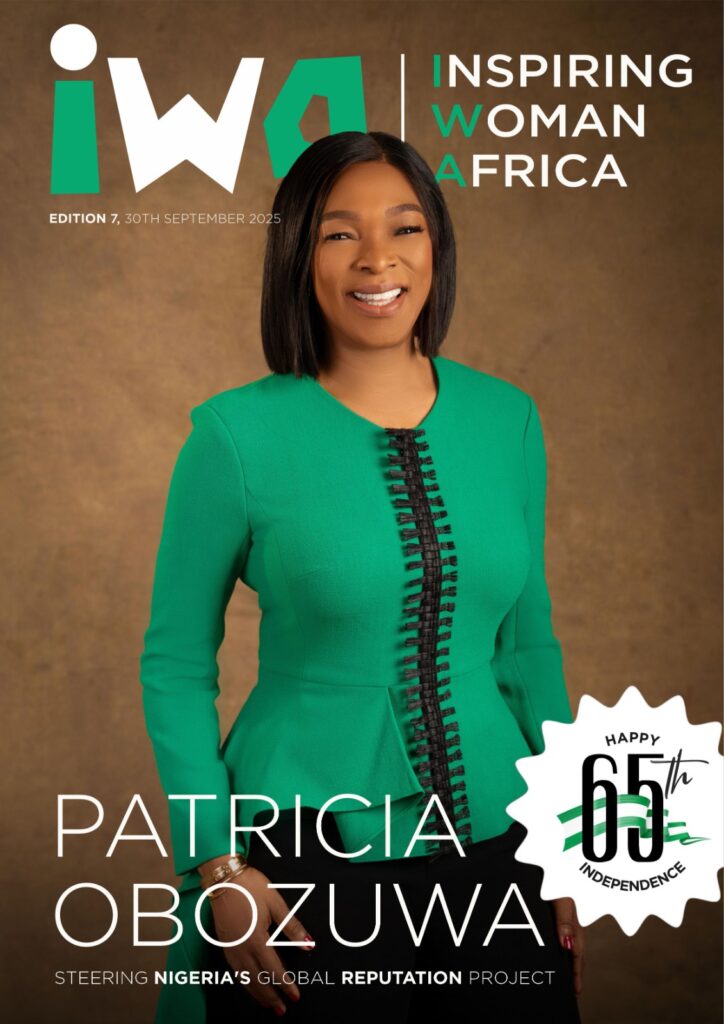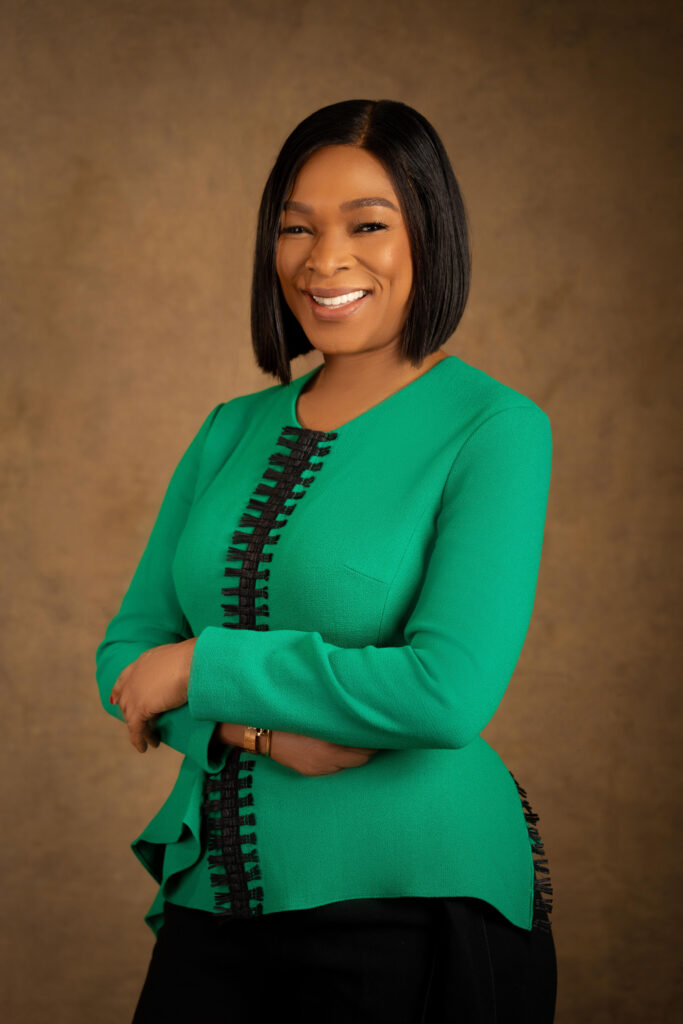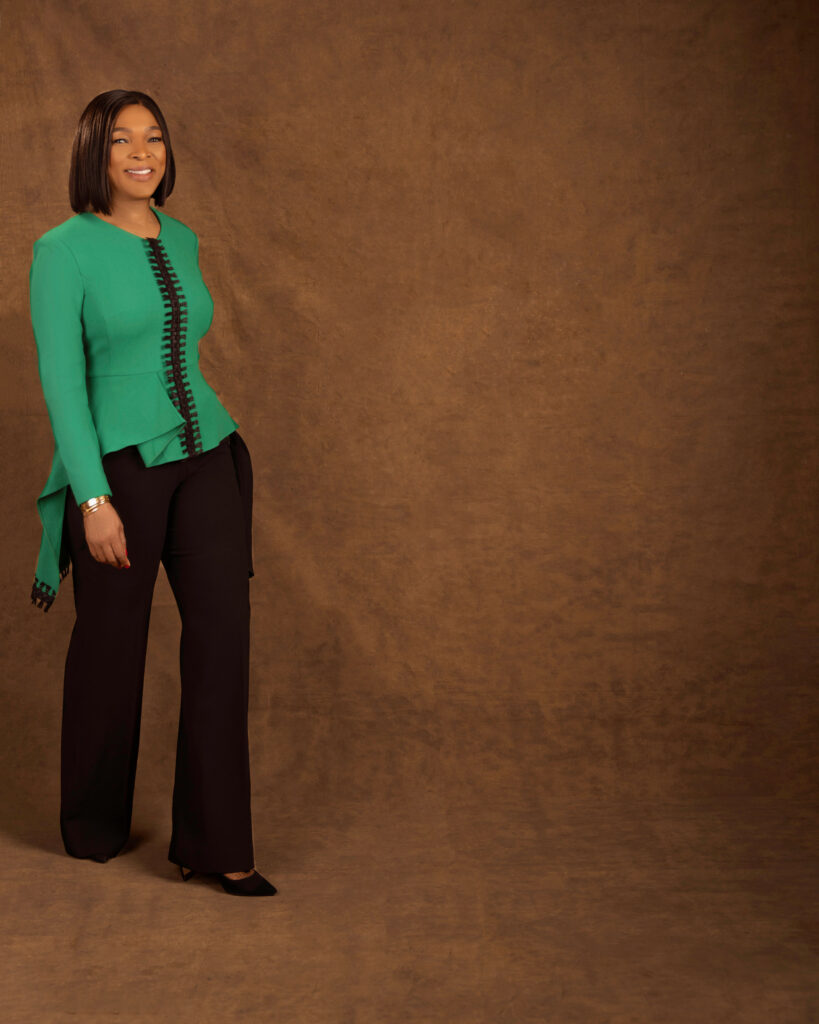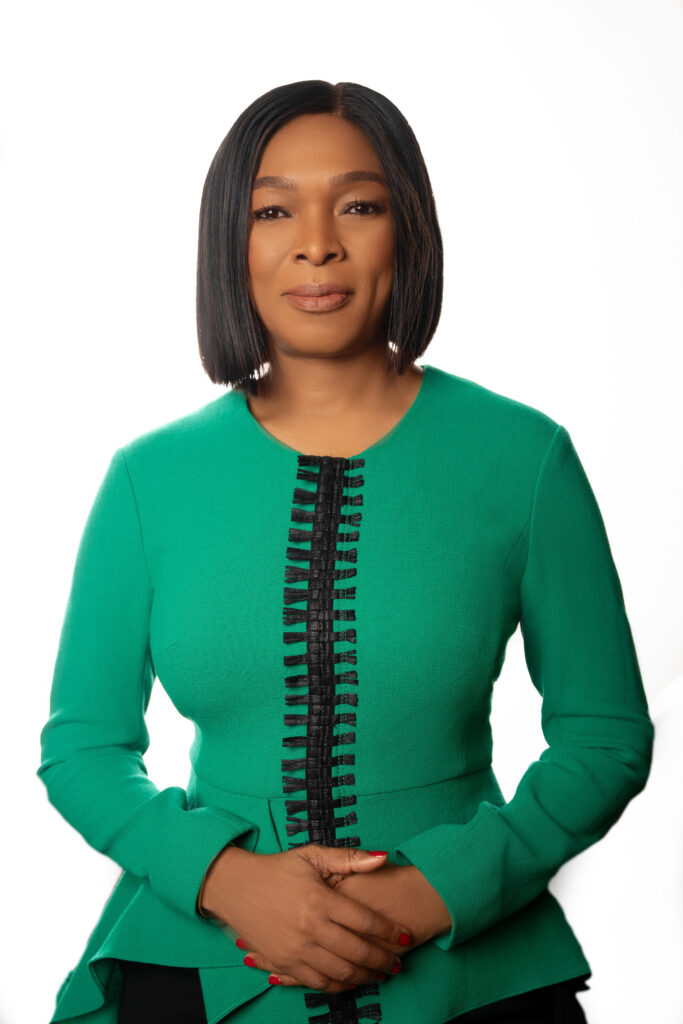
Patricia Obozuwa is the Managing Director of the Nigeria Global Reputation Management Project, the country’s official initiative dedicated to shaping and projecting a powerful, positive, and unified image of Nigeria globally.
Prior to that, she was the Vice President, Public Affairs, Communications & Sustainability, Africa at The Coca-Cola Company appointed in December 2020. There, she led a team responsible for government affairs, thought leadership, sustainability, media relations, and corporate communications for the company across the African continent.
Prior to her role at Coca-Cola, she was the Chief Communications & Public Affairs Officer for GE Africa – a position she started in April 2012 when she built the communications and public affairs function.
Prior to joining GE, she was Head, External Relations, Nigeria and Corporate Communication Leader, Sub-Saharan Africa at Procter & Gamble (P&G). Before joining P&G in 2005, Patricia was the Arts and Sponsorship Manager for the British Council in Nigeria. Patricia is a Non-Executive Director of The Water Trust (US-Headquartered Non-Profit Organization). She is also on the Advisory Council for ImpactHer, a non-profit that empowers African female entrepreneurs.
She is passionate about women’s empowerment, personal branding and telling Africa’s full story.
What exactly is the Nigeria Global Reputation Project?
It is a strategic, data-driven national initiative designed to proactively measure, manage, and enhance Nigeria’s perception on the global stage. Powered by the National Orientation Agency (NOA), it brings together government, private sector, and cultural leaders to align our national narrative with our economic and cultural realities, ultimately driving investment, tourism, and global influence.
How is this different from what the government has tried before?
This project is unique in its focus on perception intelligence (using data to guide our strategy), its collaborative model (co-creating with private sector and diaspora leaders, not a top-down government campaign), and its long-term, proactive approach (building reputation capital to prevent crises, not just reacting to negative news).
How can I or my organisation get involved?
We welcome engagement at multiple levels. You can:
• Amplify: Share positive Nigerian narratives within your global networks.
• Participate: Join our working groups or contribute insights as a sector expert.
• Partner: If your organisation has a stake in Nigeria’s global standing (e.g., in finance, tech, arts, academia), we invite you to explore formal partnership opportunities.
How will you measure success?
Through a combination of quantitative and qualitative metrics, including:
• Global Perception Indices: Tracking Nigeria’s position in recognised rankings (e.g. Anholt-Ipsos Nation Brands Index).
• Sentiment Analysis: Measuring tone and volume of international media coverage and social discourse.
• Economic Indicators: Monitoring correlations with Foreign Direct Investment (FDI) and tourism numbers (long-term).

What is the role of the NOA (National Orientation Agency)?
This project is powered by the NOA. The NOA provides the crucial grassroots reach to ensure our international narrative is authentic and reflects the domestic reality. The NOA’s mandate for national advocacy and civic education is the foundation upon which a strong, unified global reputation is built.
Isn’t this just about ‘spin’ and not addressing real problems?
Not at all. This project is founded on the principle of authentic narrative alignment. You cannot successfully spin a story that isn’t true. Our work is to ensure that the incredible progress, innovation, and cultural wealth Nigeria possesses are fairly and accurately represented globally, while we also work internally to address challenges. A strong reputation builds the trust and capital needed to solve those very problems.
Is it a government-funded project?
The project is powered by the NOA and will leverage a blended model of funding and support, including public-private partnerships, to ensure its sustainability and wide-ranging expertise.
What are the key goals of the Nigeria Global Reputation Management Project, and how do you plan to achieve them?
This project has three main goals. First, to project Nigeria’s strengths… our entrepreneurial spirit, creativity, and cultural leadership, so they become as globally recognised as our challenges. Second, to build trust by ensuring that what we communicate abroad aligns with the progress we are making at home. Third, to create a coordinated platform where government, business, civil society, and diaspora voices work together to tell a consistent, compelling story about Nigeria. We will implement a robust strategy that includes a national narrative framework, digital campaigns, media partnerships, diaspora engagement programmes, and consistent measurement of global sentiment. Rather than reinventing Nigeria’s story, we will finally, and strategically, amplify the story that is already being written every day by millions of Nigerians. And we will amplify it with clarity.
What likely challenges do you foresee you may encounter in projecting a positive image of Nigeria, and how do you intend to address them?
We must be realistic. Nigeria’s global image has often been overshadowed by negative headlines about insecurity, governance challenges, or fraud. These are not small issues, but neither are they the full story of Nigeria. Our challenge is to provide balance and perspective. I intend to address this by adopting a solutions-driven communications approach. For every story of a challenge, there is a parallel story of resilience, innovation, or progress that deserves equal attention. We will also rely on credible data and multiple voices to shift the conversation from stereotypes to substance. We are a nation of unparalleled creativity, entrepreneurial grit, and intellectual power. That story needs to be told.

How do you think the global perception of Nigeria has changed over the years, and what factors do you believe contributed to this shift?
Over the years, Nigeria’s global perception has evolved from being viewed narrowly as an oil-rich but unstable country to being increasingly recognised as a hub of creativity, innovation, and entrepreneurship. Afrobeats, Nollywood, and our booming tech ecosystem have redefined Nigeria’s identity for millions worldwide. At the same time, persistent challenges keep casting a shadow on positive perception. But today, because of digital media, Nigerians themselves are telling their stories globally. That democratisation of story-telling is one of the biggest shifts we can leverage.
Are there any specific partnerships or collaborations that is or will be pivotal for the Nigeria Global Reputation Management Project?
Strategic partnerships are at the heart of this project. We cannot succeed without the active involvement of the private sector, development partners, the diaspora, and culture leaders. International collaborations with UN agencies, multilateral banks, and global think tanks will give us reach and credibility. Locally, we will create alignment across ministries, businesses, and civic groups to ensure Nigeria speaks with one voice.
What were some of the most significant lessons you learnt while leading public affairs and communications at Coca-Cola?
Coca-Cola taught me the enduring value of brand consistency. A brand that has lasted for over a century does so by staying true to its values while continuously adapting to new realities. A company like Coca-Cola doesn’t operate in a vacuum. Its success depends on a delicate ecosystem… governments, regulators, local suppliers, distributors, NGOs, and communities. You must see your role not just as a communicator, but as a bridge-builder who creates value for all these groups. This means sometimes advocating for a policy that benefits the entire sector, not just your bottom line. Translating this to Nigeria, our nation’s reputation is not built by government decree. It is built in partnership with the private sector, our cultural ambassadors, our diaspora, and every citizen who represents Nigeria abroad. My role is to convene, align, and amplify these efforts.
Who or what has been your greatest source of inspiration throughout your career?
I have been deeply inspired by the mentors and leaders who believed in me at different stages of my career. From my early days in cultural diplomacy with the British Council to my leadership roles at P&G, GE, and Coca-Cola, I have been fortunate to learn from people who challenged me to think bigger, take bolder risks, and lead with both head and heart. They showed me that leadership is not just about results, but about the impact we have on people, communities, and society. I am also profoundly inspired by transformational figures like the Late Prof. Dora Akunyili, whose fearless leadership at NAFDAC put an end to the fake drugs problem at the time… saving lives and restoring public trust. She proved that integrity and courage can change systems. But perhaps my greatest source of inspiration has come from ordinary Africans who achieve extraordinary things. A defining moment for me was with the GE Lagos Garage, a manufacturing-based innovation hub that I established at GE. I met young innovators like Tochukwu Chukwueke, who designed and 3D-printed a clever book holder to ease the strain of reading. That simple idea earned international recognition and funding, but what inspired me most was what he did next. He used his success to establish the Clintonel Innovation Centre in Aba, creating a platform for other young inventors. Then there’s Anjola Badaru, who, when a friend’s car AC blower broke and a replacement part was unavailable, 3D-printed a fully functional blower himself. That moment of practical problem-solving became the foundation of his 3D-printed automotive parts business. People like Tochukwu and Anjola remind me that we don’t need to invent a story of Nigerian genius. The brilliance is already here. What we need is to create the stage for it. My role is to ensure that the world sees these stories, because they are the truest reflection of who we are as a nation.
How do you intend to measure the success of the Nigeria Global Reputation Management Project? What key performance indicators do you focus on?
That’s a good question. We cannot improve what we do not measure. Success for us will be gauged through media sentiment analysis, perception surveys, and benchmarking against global indices such as the Nation Brands Index. We will also monitor tangible outcomes such as increase in investment interest, tourism flows, and international partnerships. Just as importantly, we will measure whether Nigerians themselves feel proud of the story we are telling. I should add that a country’s reputation isn’t built in a day. And it requires a lot more than positive story-telling. Our actions as a country need to back our words. We are adopting a long-term approach that brings long-lasting results.
How will digital technology influence your approach to managing Nigeria’s global reputation?
Digital technology is transforming how reputations are built. For Nigeria, digital platforms allow us to bypass traditional media and engage directly with global audiences. Technology also enables authentic storytelling. Every Nigerian online can be part of shaping the country’s image. We will leverage social media, influencer partnerships, AI-driven sentiment analysis, and virtual experiences to showcase Nigeria’s culture and innovation. In essence, digital technology allows us to be faster, smarter, and more authentic. It enables us to measure the impact of our efforts in real-time and pivot our strategy based on what works.

What is your approach to building relationships with national and international media to promote a favourable image of Nigeria?
Trust is the cornerstone of strong media relations. We will work with both local and international media by providing accurate data, human-interest stories, and access to Nigerian leaders and change-makers. Our approach is proactive rather than reactive… ensuring that journalists do not only hear crisis-driven stories about Nigeria, but also stories of progress, culture, and solutions.
How do you intend to collect and incorporate feedback from citizens and stakeholders regarding Nigeria’s image on the global stage?
Listening is central to reputation management. We will establish feedback channels through citizen surveys, diaspora town halls, social media sentiment tracking, and stakeholder consultations. And the feedback will not sit on a shelf. It will inform our strategies, ensuring that Nigerians’ voices shape how we are represented globally.
What long-term vision do you have for the project, and how do you see Nigeria’s reputation evolving over the next decade?
My long-term vision is for the world to see Nigeria as a leading voice… not just in Africa, but a respected global player. A place of opportunity and innovation. In ten years, I see this evolution clearly. We’ll stop talking about our reputation defensively and start leveraging it proactively. We’ll shift from correcting misconceptions to leading global conversations in sectors like tech and the creative industries. When global decisions are made we will be listened to with respect. Our goal is to make this work permanent. Success means baking reputation management into our national DNA… where government policies and business decisions naturally consider the impact on how we’re perceived globally. We won’t need a project because a strong, positive reputation will be a core, non-negotiable part of our national strategy and our economic value.
How do you balance local narratives with the expectations of global audiences in your messaging?
Balancing local and global narratives requires authenticity. We must tell stories rooted in Nigerian realities… our challenges and triumphs… while framing them in a language that resonates globally. For instance, a local innovation in fin-tech can be presented as part of a global conversation about financial inclusion. So, we don’t change the local story to fit a global mold. Instead we translate its significance. We ensure the local context is respected and clear, but we highlight why it matters to the world. We show how Nigeria’s solutions, culture, and creativity are relevant to global audiences because they speak to shared human and economic interests. The key is alignment… staying true to who we are while speaking to what the world cares about.